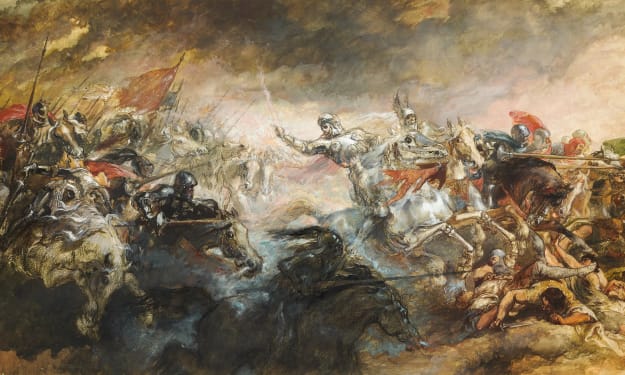How to Fix Who We are on the Internet
Why Plato's lessons on morality are more important than ever

People on the internet are assholes. No really. If you've ever scrolled through a politically oriented Twitter thread or a Facebook post long enough, you'll come across some seriously impressive spectacles of offensive language. If people sat next to one another in a room, I can guarantee there is absolutely no conceivable way that we would speak to one another the way we do online without punches being thrown.
This is ultimately because digital communication removes all the real-world consequences of speech. All of the regular evolutionary social stuff that we've evolved to keeps us in line, such as; facial expressions, body language, the fear of being disliked in an immediate group, and the threat of physical violence, are all completely absent from our digital behaviours.
That's why I am arguing that a new term for this phenomenon be called: Digital Speech; as it is entirely different from all other forms of speech.
Digital Speech, unless we are employed in a very forward-facing profession such as politics or the public sector (and even then, outrageous digital speech can actually work in one's favour - Donald Trump), then we are typically safeguarded from all forms of regular social accountability. Before we get started on this I don't for one second, want you to think that I am writing this from a place of nobility. As a member of a digital generation, I have distinct experience in petty online argumentation that's resulted in the trading of insults and vulgarity.
This is why my recent research into the world of Digital Speech has left me slightly bewildered. It has directly underpinned a huge part of my online life without me even realising it.
The Internet is Not Just a Mega-Hyperlinked Windshield…
The troubling trend of deeply enjoying verbal skirmishes without being victim to any socio-physiological consequences is extremely similar to the outbursts we have when things don't go as planned in traffic.
For all of us that drive cars, we can recall a time we've yelled at someone that has cut us off in traffic or blatantly sped up as we've tried to overtake them. As we rocket along the highway in our separate metal bubbles, kept safe from the usual social norms by our windshields; our immature outbursts are almost completely private except for the occasional explicit miming we see in another driver as they flip someone off.
Being a bit harsh, letting off some steam and dropping some expletives is not only what we tend to gravitate towards naturally out of pure irritation, but there is also a subtext of guilty pleasure involved as well.

It feels good to get angry, to string a few effective insults together, and then after you've let off steam, just go straight back to driving along. However, the internet is not a car, and Facebook is not our windshield. It's an open, semi-permanent discussion forum in which hundreds of millions of people can see exactly what we're saying in a matter of seconds, and this is a cataclysmic problem for political and moral polarisation in the modern world.
Plato's Advice for the Internet Faring Human
Consider Plato's allegory of The Ring of Gyges: Two characters: Socrates and Glaucon are involved in a debate over the existence of morality, in which the character Glaucon suggests that morals are entirely socially regulated. He argues this point by giving Socrates the example of the Ring of Gyges; a ring that allows the wearer to be completely invisible, meaning that they could steal whatever they wanted, have sex with whomever they pleased and eavesdrop on any conversation without anyone ever knowing that they were there. Glaucon gives us a worldview where people are self-interested, dangerous and untrustworthy, and that morality is not inherent to us as humans. This leads Glaucon to conclude that our moral behaviour emerges purely out of the fact that we are socially accountable for our actions. Socrates disagrees and declares that no moral man would have use for such a ring…
Luckily for Glaucon, the majority of modern research into moral development outlined in Jonathan Haidt's most recent work: The Righteous Mind; shows that our inclination to shy away from social rejection and large scale disapproval is indeed one of the main driving forces behind our moral behaviour. Sorry Socrates. This information is deeply troubling when we extend it into a world in which the Ring of Gyges is not just an ancient Greek thought experiment, rather it is everyone's pocket with an OLED touch screen and immediate access to inconceivable amounts of information.
When we learn to speak and socialise between the ages of 2 and 4 our parents and peers are quick to steer us towards the realm of manners, civility, and politeness. Being civil makes the social world infinitely easier to navigate. The world becomes an exponentially better place as we learn to cooperate and articulate our speech in a dignified manner that serves our purposes whilst respecting the social bounds of others.
But unlike our real-world social behaviour, we have never been given a lesson of politeness in the domain of social media. Not once.
As we get older, smartphones inevitably land in our hands and Facebook accounts are opened without a single word being said about civility in the domain of the internet. It's simply assumed that because we've learned to socialise relatively well in face to face scenarios that this will somehow cross over into the domain of the digital.
Wrong.
Quite simply, we become tribalistic animals on the internet. And there is absolutely no one that calls us out on it.
Political and moral polarisation has been the underlying characterisation of our era, and it is due to a variety of factors, many of which are out of our immediate control.
The Ever-Pervasive Problem of Echo Chambers
Modern digital news media curtails content that we want to hear, designs our newsfeeds to be awash with information that keeps us online and we ourselves naturally subscribe to the ideas we like. We dive headfirst into a pool of information that we agree with and as a result are only exposed in a positive way to communities that we want to agree with. Resultantly, people that find themselves on the other side of our personal and political opinions land in the digital "them" category, as we imagine our online counterparts in some stupid, crazy part of the internet filled with "fake news" and other lies.
The information that we surround ourselves and find our natural inclination to agree with organically becomes what we define as truth, and so; when a person with a conflicting belief set stumbles across a post of that depicts our 100% correct and fully socially verified way of perceiving the world, and decides to make a nifty counterargument, they are met with the full unbridled force of our disagreement and an unusual amount of disdain.
And so; when we give entire communities of people with insatiable confirmation biases a platform that delivers no accountability for their online behaviour and somehow expect civil discourse to ensue, we are being naive to an extent that is almost unimaginable. Sadly, it gets worse from here. Not only does our non-civil discourse on the internet divide us into camps of right and wrong, this digital tribalism actually rewards your nastiest statements and most cruel of derisions with a sea of likes and comments drafted by the anonymous "my side" fingers tapping on keyboards from within our own moral camps…
Our relatively recent liberal democratic software that runs our everyday political and social systems, operates seemingly in direct contrast with the resultant effects of social media politicking; which instantaneously throws us right back to our biological blueprint for social tribalism. YouTube is a perfect example, having thousands of videos titled: "Sam Harris DESTROYS Left-Wing Reporter", "Bernie Sanders SCHOOLS Conservative College Student" and so on…
This sort of irrational caricaturing of discussions has to lead to an enormously polarised political discussion. Anything that could resemble real discussion has been eroded by our desire to not only defend our little house of beliefs but also to uphold our standing within our moral and political tribes. Part of any good discussion is realising that you may very well be wrong, and then figuring out with your conversation partner how that might be.
So, if everyone is truly rewarded for being an asshole on the internet, how do we curb our tribal instincts in the face of a social realm that rewards our darkest impulses and most cruel statements?
Don't Be One of the Assholes
Like all good solutions; start small. Start recognising when you're scrolling, and you start to get irritated. When your thumbs are primed to strike out a series of ruthless taps that will paint a masterfully violent digital portrait, take a second to realise what's happening.
You're not bettering yourself, and you're certainly not bettering anyone else. Nothing good will come of this. Even if you are 100% correct and you do decide to blatantly school someone in whatever issue you're about to get stuck into, you've done absolutely nothing to help educate yourself or that person. "Destroying" someone's argument is not going to make you win, it just makes you both lose. You didn't convince anyone of anything, you just created an even larger divide between you and the person who you would like to share your opinion.
Therefore, what we must understand is that people on the internet must be spoken to as if they were in the same room as us right now. Respectful digital speech starts with you, and it starts by cooling down our tribal impulses, soothing our intellectual superiority complexes and understanding that by behaving like an ass on the internet isn't going to create anything good in the future. Even when people are wrong, even when they launch assaults at you, take a step back to our moral lessons that we went over all the way back in primary school and: "walk away" or "be the bigger person". Because that's exactly what you will do. By engaging with people in pointless online moral battleship discussions you just make the whole problem worse. Immediately, there is no real benefit to this scenario until others start to engage in respectful political dialogue as well, however; if we can't make it better, just at least, try not to make it worse.
Thomas Mitchelhill
Writer | Business Builder | Endurance Athlete | Existence Enthusiast
Get in touch with me: HERE
About the Creator
Ginsberg
Navigating the intersection of philosophy & finance in the world of modern capitalism







Comments
There are no comments for this story
Be the first to respond and start the conversation.